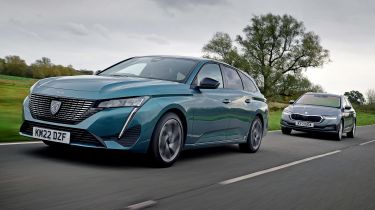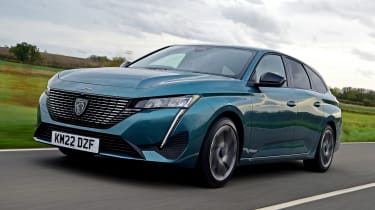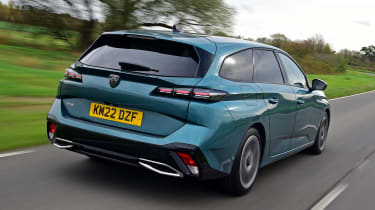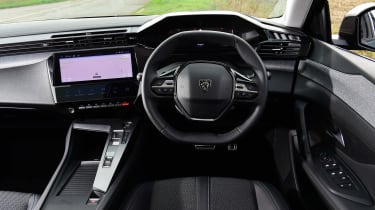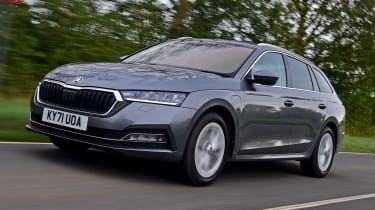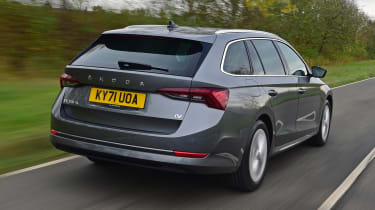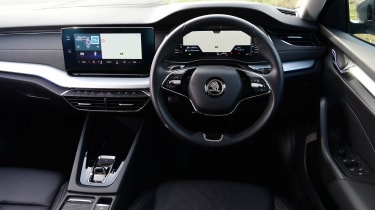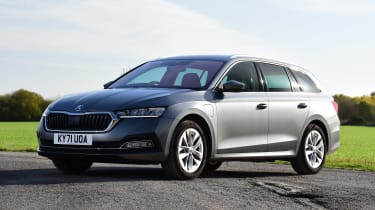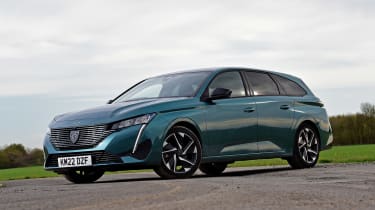Peugeot 308 SW vs Skoda Octavia Estate: 2022 twin test review
The new Peugeot 308 SW injects some style into the compact estate car class, but is it also a better load-lugger than the Skoda Octavia?
The estate car segment is split into very distinct categories. On the one hand, there’s the sensible, practical workhorse – one where desirability takes such a distant back seat that it might as well just sit in the vast boot instead. At the other end of the scale, there are the style-led alternatives. These cars sacrifice some of the ultimate carrying capacity in order to produce a striking silhouette – a shooting brake that holds your attention better than your stuff.
With the 308 SW, however, Peugeot reckons it can offer buyers the best of both worlds. The latest model has already shown plenty of promise in hatchback form, with several significant improvements over its predecessor.
It’ll be up against the toughest competition of all, though, because the Skoda Octavia Estate has been largely untouchable in this class. Previous versions have been all about space, but the latest model injects a little bit of elegance itself.
So do these cars manage to combine style and substance? And is the 308 SW finally the car to wrestle the estate car crown away from Skoda?
Peugeot 308 SW
| Model: | Peugeot 308 SW PureTech Allure Premium |
| Price: | £29,100 |
| Engine: | 1.2-litre 3cyl turbo, 129bhp |
| 0-62mph: | 9.9 seconds |
| Test economy: | 46.5mpg/10.2mpl |
| CO2: | 131g/km |
| Annual road tax: | £165 |
The load-lugging Peugeot 308 SW is available with the same engines and in the same trims as the hatchback, and the wagon carries a price premium of £1,200 over the five-door. The range starts from £26,580, and here we’re testing the Allure Premium model, which is one level below the top spec.
Used - available now

2025 Toyota
Yaris Hybrid
37,962 milesAutomaticPetrol1.5L
Cash £14,300
2022 MG
HS
41,109 milesAutomaticPetrol1.5L
Cash £15,663
2023 Tesla
Model 3
26,881 milesAutomaticElectric
Cash £21,000
2019 Ford
Kuga
69,946 milesAutomaticDiesel2.0L
Cash £11,763Design & engineering
For this version of the 308, Peugeot has used an evolution of the EMP2 platform found under the previous-generation model. Around 70 per cent of the components are new, though, while mild-hybrid, plug-in and all-electric powertrains can be accommodated. A zero-emissions e-308 is coming in 2023, but for now engines comprise a 1.2-litre PureTech three-cylinder turbo petrol, a 1.5 BlueHDi four-cylinder diesel – both making 129bhp – and a 1.6 plug-in hybrid in two power outputs.
For the SW estate, the 308’s wheelbase has been stretched by 55mm, while the car’s overall length is increased by 300mm. In profile, it’s clear that the changes to the SW take place from the B-pillars back, with an extended roofline with roof rails, a single piece of glass for the rear doors and large windows added to the C-pillars as part of a longer rear overhang. At the back, the number plate is moved from the bumper to the tailgate, while sharp angles and creases give the Peugeot a distinctive look.
This angular appearance continues inside, with a dashboard that features sharp edges, a bank of toggle switches and plenty of glossy screens on this Allure Premium model. Peugeot has used its i-Cockpit layout in the 308, and while the design looks smart, the arrangement of high-set dials that you look at over the top of the small steering wheel is an acquired taste. It means that many drivers will probably need to alter their seating position to be able to see them properly – it’s still a feature that we’d recommend trying out before signing on the dotted line.
If you can live with this layout, then you’ll be able to take advantage of the 308’s premium build quality. It’s packed with upmarket materials and has decent switchgear, while the Allure Premium model has all the kit you could possibly need. What’s more, it manages all this while coming in at a significantly lower price than the Skoda Octavia here.
Driving
While the 308 SW’s small, chunky steering wheel offers a sporty feel in your hands, the driving experience doesn’t really live up to the promise. There’s nothing much wrong with the way that the Peugeot drives, it’s just geared more towards comfort than sharp handling.
Peugeot’s 1.2 PureTech turbo petrol three-cylinder engine features here, but while it provides decent performance, it’s hampered somewhat by the standard-fit automatic gearbox. The eight-speed transmission is rather slow-witted in its responses, taking a moment to react to your inputs with the throttle. It’s especially frustrating at low speeds, where the brake pedal responds sharply and makes it difficult to be smooth in stop-start traffic.
Matters improve the faster you go, and on the motorway the 308 SW is a refined cruiser. There’s next to no wind noise at 70mph, but road noise can be quite harsh when travelling over rough surfaces. The ride is pretty smooth for the most part, although bumps can upset the car a little.
The small steering wheel is linked to a fast rack, so the car turns sharply, but the suspension wallows a bit, discouraging you from pushing too hard in corners.
Practicality
There are lots of useful storage cubbies in the front of the 308 SW, with a deep centre console bin and two more recesses ahead of that. There’s a wireless charging pad for smartphones, as well as two USB-C sockets. One of the recesses is designed for phones, and features a hole in the bottom to feed a charging cable through to one of the charging points. Unlike older 308s, the glovebox isn’t hindered by a fusebox and is a decent size, although it’s still not as big as the Octavia’s.
If an estate car is to do a good job as family transport, then it needs to offer useful passenger space in the back. Unfortunately, the 308 SW is compromised when compared with the Octavia.
For starters, the rear door openings aren’t as wide, so access is a bit trickier. Once in, the SW’s extended roof line over the hatch means there’s an extra 16mm of headroom, and there are no complaints in this regard, but as in the hatchback model, rear legroom is compromised. With a tall driver, the legroom behind is only really suitable for smaller occupants, while the transmission tunnel restricts foot space for the middle seat, too.
There are two sets of Isofix points located behind zips in the upholstery, while a pair of air vents and USB-C sockets are also on offer. That’s the same as can be found the Octavia, but the Skoda has brighter rear cabin lighting than in the Peugeot.
Ownership
Peugeot put in a very impressive showing in our 2022 Driver Power owner satisfaction survey. It took fourth place out of 29 brands overall in the manufacturer category, while its dealer network was rated the third best, behind only Honda and Lexus.
Skoda’s ratings were much lower in both surveys. It could only muster 20th in the manufacturer category, while its dealers finished 16th out of 17.
Running costs
The desirability of its striking looks works in the Peugeot’s favour when it comes to residual values. After three years and 36,000 miles, the 308 SW is predicted to hold on to 51.8 per cent of its original value, compared with 47.6 per cent for the Skoda.
That means that you’ll lose around £2,000 less over that period if you buy the Peugeot – something private buyers should certainly take into account.
Testers’ notes: “Choose the top-spec 308 SW GT, and the climate control monitors the air quality inside and out to give occupants the freshest cabin possible.”
Skoda Octavia Estate
| Model: | Skoda Octavia Estate 1.5 TSI e-TEC DSG SE L |
| Price: | £30,860 |
| Engine: | 1.5-litre 4cyl turbo, 148bhp |
| 0-62mph: | 8.7 seconds |
| Test economy: | 47.1mpg/10.4mpl |
| CO2: | 123g/km |
| Annual road tax: | £155 |
The Skoda Octavia has been the Best Estate at our New Car Awards for three years running, so it’s clearly a tough act to beat. Here we’re testing the 1.5 TSI e-TEC mild-hybrid model, which comes only in well specced SE L trim with a DSG gearbox (a 1.4 PHEV is pictured). However, at £30,360, it’s £1,760 more than the 308 SW Allure Premium here.
Design & engineering
It’s common knowledge that all of the VW Group brands share technology, but arguably Skoda makes best use of the tools at its disposal. The regular Octavia is larger than most compact hatchback rivals, while the estate model tested here is 54mm longer than the 308 SW. It’s taller, too, but although it isn’t as wide and its wheelbase isn’t as lone, this doesn’t have a detrimental affect on passenger space.
Power for the model tested here comes from VW’s 1.5-litre TSI four-cylinder turbo petrol engine. This features cylinder-deactivation tech to boost efficiency, while the DSG auto-equipped model has also been enhanced with Skoda’s e-TEC package. This mild-hybrid system was first offered with the 1.0-litre TSI three-cylinder, and comprises a 48-volt battery and belt-driven starter-alternator that helps take loads off the engine, which allows for longer periods of running with the engine off.
The rest of the Octavia Estate is as conventional as you would expect. The bodywork has evolved to incorporate some subtle curves, while the large grille has grown over time, and the Skoda badging across the tailgate adds a bit of class, too. However, it really does fade into the background when compared with the extravagant-looking Peugeot.
Inside, the Octavia is also more restrained than its rival here, but that’s no bad thing. Build quality is first class, while the black and white displays with Skoda’s subtle green highlights feel high-class, whereas the 308 SW’s graphics are quite showy.
Choose the 1.5 TSI e-TEC DSG, and it comes exclusively in SE L trim, which is pretty well equipped, albeit for a higher list price than the 308 SW in Allure Premium spec.
Driving
With 148bhp to the Peugeot’s 129bhp, the Octavia Estate was always going to be the faster car in a straight line. Its 0-62mph time of 8.7 seconds is 1.2 seconds faster than the 308 SW’s, and the combination of the engine’s linear power delivery and slick changes of the seven-speed DSG twin-clutch gearbox means progress is a lot smoother than in the 308 with its hesitant shifts. The four-cylinder configuration is more refined, too, not that the Peugeot’s three-cylinder growl is particularly intrusive.
The Skoda’s gearbox is keen to move into the highest gear possible to boost efficiency, while the mild-hybrid system smooths things out at lower speeds. The engine cuts out before you’ve come to a halt – and the brakes aren’t as sharp as the 308’s when you press the pedal – while the motor quickly comes back to life when you’re ready to move off again.
One surprise for any driver getting behind the wheel of the Octavia is how agile it is. Under the skin is the VW Group’s MQB platform architecture, which always manages to deliver engaging handling, no matter the size or shape of the car it’s been used with.
A quick steering rack helps with this feeling of agility, and while the suspension is soft, body roll is well controlled, so the Octavia is a lot more fun than its conservative looks would lead you to believe.
Practicality
Estate cars need to be spacious, and when it comes to the raw numbers, the Octavia is still the front-runner in the class. There’s a 640-litre cargo capacity on offer in five-seat mode, which is 32 litres more than is available in the 308 SW. Fold the seats, and you have 1,700 litres to play with, which is 66 litres ahead of the Peugeot.
Rear-seat space is also more generous, with greater leg and headroom for all three passengers. If you’re only travelling two-up in the back, then the centre-seat backrest folds down to create an armrest that is kitted out with a pair of cup-holders.
One area where the Octavia could be better is front cabin storage. There’s an armrest cubby and twin cup-holders that feature Skoda’s clever grip system, which means you can open bottles one-handed, but none of it is as generously proportioned as the Peugeot’s centre console storage.
Ownership
The Octavia scooped the maximum five stars from Euro NCAP when it was assessed back in 2019. Eight airbags are fitted as standard, while active safety systems include lane assist, which can warn you if you veer towards the edge of your lane, and gently steer you back if necessary, although this can sometimes be unnerving as the wheel moves in your hands.
The 308 was tested in 2022, but it achieved only four stars, albeit under a tougher regime than the Octavia’s 2019 exam. The Peugeot’s 76 per cent score in the adult occupant category is the lowest so far this year. While it didn’t score highly for its standard safety tech, its active safety brake system is able to detect both cyclists and pedestrians, even at night.
Running costs
Official economy figures for both cars stand at 52.1mpg, and our test results were pretty even, too, with the Peugeot returning 46.5mpg and the Skoda slightly ahead, at exactly 47mpg.
The Skoda will likely have a slight advantage if you do more urban driving, courtesy of its mild-hybrid system, but both cars feature stop-start to help conserve fuel. If you cover longer distances, then the 308’s 52-litre fuel tank is seven litres bigger than the Octavia’s, so it can go further between fills, even when based on our test figures.
Testers’ notes: “If you tow a caravan, then the Octavia Estate has an advantage thanks to a maximum towing weight of 1,500kg, which is 300kg more than the 308 SW’s.”
Verdict
First place: Skoda Octavia Estate
There’s still only one choice if you want the most practical family estate of all, and that’s the Octavia. While the Peugeot undercuts it on price and runs it close in some areas, especially cabin storage, there’s no escaping the all-round ability of the Octavia Estate. It’s worth the extra outlay for its bigger boot, as well as the more rounded driving experience.
Second place: Peugeot 308 SW
The latest 308 SW feels like an upmarket product, looks distinctive and is one of the bigger estates available in the class, but there are a few too many niggles for it to take victory here. If you can get along with the driving position, then there’s still the jerky automatic gearbox to contend with, while the cramped back seats mean it’s a less practical family car than the Octavia.
Other options in this category...
Toyota Corolla Touring Sports
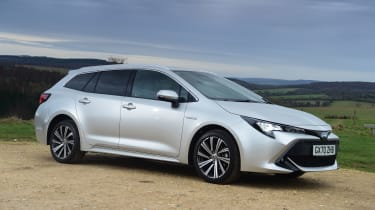
- Price: £32,515
- Engine: 1.8-litre 4cyl hybrid, 138bhp
The recently facelifted Corolla Touring Sports has a 598-litre boot, so it falls a tiny bit short of its rivals here, but the Toyota fights back with its pair of hybrid powertrains, which make it impressively frugal, especially in town. It’s great to drive, too.
Vauxhall Astra Sports Tourer
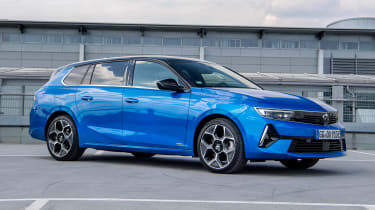
- Price: £30,835
- Engine: 1.2-litre 3cyl turbo, 129bhp
One way of bypassing the Peugeot’s quirky cabin layout is to choose the mechanically identical Astra. The boot is smaller at 597 litres, but GS Line models come well equipped, and you can avoid the auto box by picking the £1,500 cheaper manual model.
Figures
| Skoda Octavia Estate 1.5 TSI e-TEC DSG SE L | Peugeot 308 SW PureTech Allure Premium | |
| On the road price/total as tested | £30,860/£30,860 | £29,100/£29,100 |
| Residual value (after 3yrs/36,000) | £14,699/47.6% | £15,074/51.8% |
| Depreciation | £16,161 | £14,026 |
| Annual tax liability std/higher rate | £1,776/£3,553 | £1,787/£3,573 |
| Annual fuel cost (12k/20k miles) | £1,897/£3,161 | £1,917/£3,195 |
| Insurance group/quote/VED | 20/£664/£155 | 19/£701/£165 |
| Cost of 1st/2nd/3rd service | £456 (2 years) | £637 (3 years) |
| Length/wheelbase | 4,689/2,686mm | 4,635/2,735mm |
| Height/width | 1,468/1,829mm | 1,442/1,850mm |
| Engine | 4cyl in-line/1,498cc | 3cyl in-line/1,199cc |
| Peak power/revs | 148/5,000 bhp/rpm | 129/5,500 bhp/rpm |
| Peak torque/revs | 250/1,500 Nm/rpm | 230/1,750 Nm/rpm |
| Transmission | 7-spd auto/fwd | 8-spd auto/fwd |
| Fuel tank capacity/spare wheel | 45 litres/repair kit | 52 litres/dealer fit |
| Boot capacity (seats up/down) | 640/1,700 litres | 608/1,634 litres |
| Kerbweight/payload/towing weight | 1,437/473/1,500kg | 1,345/515/1,200kg |
| Turning circle | 10.4 metres | 10.7 metres |
| Basic warranty (miles)/recovery | 3yrs (60k)/3yrs | 3yrs (60k)/1yr |
| Driver Power manufacturer/dealer | 20th/16th | 4th/3rd |
| NCAP: Adult/child/ped./assist/stars | 92/88/73/79/5 (’19) | 76/84/68/65/4 (’22) |
| 0-62mph/top speed | 8.7 secs/142mph | 9.9 secs/131mph |
| Test mpg/mpl/range | 47.0/10.4/465 miles | 46.5/10.2/532 miles |
| Best WLTP combined | 52.1mpg | 52.1mpg |
| Best WLTP combined | 11.5mpl | 11.5mpl |
| Claimed CO2/tax bracket | 123g/km/29% | 131g/km/31% |
| Airbags/Isofix/park sensors/camera | Eight/yes/f&r/yes | Six/yes/f&r/yes |
| Auto box/lane keep/blindspot/AEB | Yes/yes/yes/yes | Yes/yes/yes/yes |
| Climate control/adaptive cruise | Yes/yes | Yes/yes |
| Leather/heated seats | £250/yes | £2,050/yes |
| Metallic paint/LED lights | £660/yes | £545/yes |
| Keyless entry & go/powered tailgate | Yes/£870 | Yes/£850 |
| Sat-nav/digital dashboard | Yes/yes | Yes/yes |
| DAB/connected services | Yes/yes | Yes/yes |
| Wireless charge/CarPlay/Android Auto | £355/yes/yes | Yes/yes/yes |
